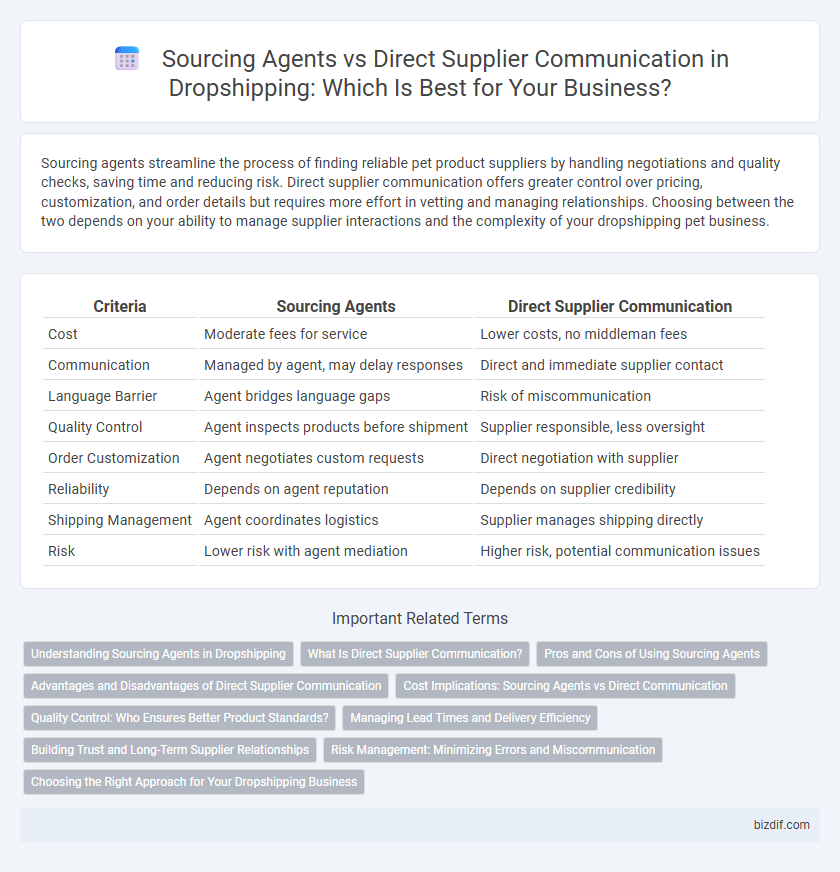Sourcing agents streamline the process of finding reliable pet product suppliers by handling negotiations and quality checks, saving time and reducing risk. Direct supplier communication offers greater control over pricing, customization, and order details but requires more effort in vetting and managing relationships. Choosing between the two depends on your ability to manage supplier interactions and the complexity of your dropshipping pet business.
Table of Comparison
| Criteria | Sourcing Agents | Direct Supplier Communication |
|---|---|---|
| Cost | Moderate fees for service | Lower costs, no middleman fees |
| Communication | Managed by agent, may delay responses | Direct and immediate supplier contact |
| Language Barrier | Agent bridges language gaps | Risk of miscommunication |
| Quality Control | Agent inspects products before shipment | Supplier responsible, less oversight |
| Order Customization | Agent negotiates custom requests | Direct negotiation with supplier |
| Reliability | Depends on agent reputation | Depends on supplier credibility |
| Shipping Management | Agent coordinates logistics | Supplier manages shipping directly |
| Risk | Lower risk with agent mediation | Higher risk, potential communication issues |
Understanding Sourcing Agents in Dropshipping
Sourcing agents in dropshipping act as intermediaries who streamline product procurement by connecting sellers with verified manufacturers, ensuring quality control and negotiating better prices. They save time and reduce risks associated with direct supplier communication, especially when dealing with suppliers in foreign markets where language and cultural barriers exist. Utilizing sourcing agents can enhance supply chain efficiency and improve product consistency, making them valuable partners for dropshippers seeking reliable sourcing solutions.
What Is Direct Supplier Communication?
Direct supplier communication involves engaging personally with manufacturers or wholesalers to manage orders, negotiate prices, and address product details without intermediaries. This approach streamlines the supply chain, enhances transparency, and often results in faster response times and reduced costs. Effective direct communication requires language proficiency, market understanding, and negotiation skills to ensure reliable fulfillment and quality control.
Pros and Cons of Using Sourcing Agents
Using sourcing agents in dropshipping offers streamlined supplier selection and quality control, reducing the risk of counterfeit products and ensuring reliable shipping timelines. However, relying on sourcing agents can increase costs due to their service fees and may introduce delays in communication compared to direct supplier interaction. Direct supplier communication provides better pricing negotiation and faster response times but requires more experience to avoid unreliable partners and quality issues.
Advantages and Disadvantages of Direct Supplier Communication
Direct supplier communication in dropshipping offers advantages such as clearer negotiation on pricing, customization options, and faster issue resolution, which can improve product quality and customer satisfaction. However, this approach requires more time investment, language barriers may arise, and lack of intermediary support can increase risks related to order errors or delayed shipments. Businesses must weigh these factors against scalability needs and resource availability when choosing direct communication over sourcing agents.
Cost Implications: Sourcing Agents vs Direct Communication
Using sourcing agents often involves additional fees or commissions, which can increase overall product costs compared to direct supplier communication. Direct communication with suppliers helps reduce intermediary expenses, allowing for better negotiation on pricing and potentially higher profit margins. However, sourcing agents can save time and minimize risks by handling supplier vetting and logistics, which might offset their additional costs depending on the business scale.
Quality Control: Who Ensures Better Product Standards?
Sourcing agents often provide enhanced quality control by conducting thorough supplier vetting, factory audits, and pre-shipment inspections, ensuring products meet specified standards before reaching the dropshipper. Direct supplier communication may risk inconsistent quality due to limited oversight and reliance on supplier honesty, potentially leading to higher defect rates and customer dissatisfaction. Leveraging sourcing agents can result in better product reliability and smoother post-order management for dropshipping businesses focused on maintaining superior product standards.
Managing Lead Times and Delivery Efficiency
Sourcing agents streamline lead times by leveraging established supplier networks, ensuring faster order processing and consolidated shipments that enhance delivery efficiency. Direct supplier communication allows for real-time negotiation and customization, potentially reducing delays caused by middlemen but requiring more effort in managing multiple contacts. Balancing the benefits of sourcing agents and direct suppliers depends on the complexity of product needs and the importance of maintaining tight control over logistics timelines.
Building Trust and Long-Term Supplier Relationships
Sourcing agents act as intermediaries who streamline communication and help build trust between dropshippers and suppliers by vetting product quality and ensuring reliable delivery, fostering stronger long-term partnerships. Direct supplier communication, while requiring more effort in negotiation and quality control, allows for clearer terms and personalized interactions, which are crucial for developing deep supplier trust and sustaining ongoing collaboration. Establishing transparent expectations and consistent communication protocols in either approach significantly enhances supplier reliability and supports scalable dropshipping operations.
Risk Management: Minimizing Errors and Miscommunication
Sourcing agents act as intermediaries who streamline communication with international suppliers, reducing language barriers and cultural misunderstandings that can lead to costly errors in dropshipping operations. Direct supplier communication offers greater control but increases the risk of miscommunication, shipment delays, and product inconsistencies without a proficient understanding of foreign markets. Employing sourcing agents effectively minimizes risks by ensuring clearer order specifications, quality checks, and timely updates, which enhances overall supply chain reliability and reduces costly mistakes.
Choosing the Right Approach for Your Dropshipping Business
Choosing the right approach between sourcing agents and direct supplier communication depends on your dropshipping business size and product complexity. Sourcing agents offer expertise in product quality checks, negotiation, and logistics, reducing risks for new or small-scale entrepreneurs. Direct communication with suppliers often results in lower costs and faster response times, ideal for experienced dropshippers managing high order volumes.
Sourcing Agents vs Direct Supplier Communication Infographic

 bizdif.com
bizdif.com